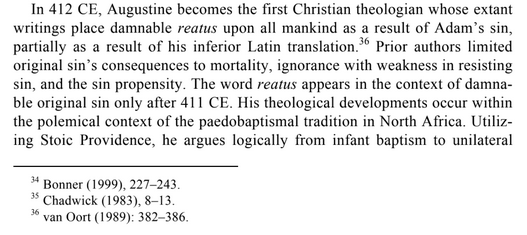
Athanasius Spoke of Original Sin
Pushing the timeline back half a century from the magical year 412, Athanasius wrote his Discourses Against the Arians around the year 360. Here is his statement and I will follow that with some of my thoughts.
For no longer according to our former origin in Adam do we die; but henceforward our origin and all infirmity of flesh being transferred to the Word, we rise from the earth, the curse from sin being removed, because of Him who is in us, and who has become a curse for us. And with reason; for as we are all from earth and die in Adam, so being regenerated from above of water and Spirit, in the Christ we are all quickened; the flesh being no longer earthly, but being henceforth made Word , by reason of God’s Word who for our sake ‘became flesh.’
Athanasius, Discourse Against the Arians, III.33
As I have been reading a great amount of the writings from the Church Fathers over the past 3 years (not just from Augustine) and as I have specifically been focusing in on the topic of original sin in response to Dr. Wilson, I have realized that there is a fatal flaw, if you will, in the way that the “traditionalists” today think they understand this doctrine. This is especially the case when they do not pause to consider the contextual implications of what they have just read. Let us take for instance this above statement from Athanasius. On a quick read, someone might take away the following: “Here Athanasius is clear that when he speaks of death he is referring to our physical mortality since he said something about our deaths and related it to ‘flesh’. It’s clear that he was not referring to anything spiritual being reckoned to us as guilt from Adam.”
But is this a fair reading of Athanasius or any other Church Father who wrote on original sin? Let’s analyze what Athanasius said.
- We don’t die according to our former “origin” in Adam.
- From now on, as Christians, our “origin” and infirmity of flesh is transferred to Christ.
- That being so, we rise from the earth with the curse from sin removed as Christ became the curse for us.
- We’re from earth and “die in Adam.”
- Being “regenerated from above of water and Spirit” we are “quickened” in Christ.
- Our “flesh” is no longer “earthly” but made Word since Christ had become flesh.
What Athanasius was saying here, some 30 years before Augustine’s earliest writings, was not that our death like Adam’s was merely human mortality. He said we do not die like our origin in Adam as believers. But, like Adam, all believers do physically die. If our only death like our origin in Adam was physical, then what Athanasius said would make no sense. Since he wasn’t speaking in this instance of physical death, Athanasius could proceed to say that with sin’s curse removed we then rise from the earth and are “regenerated from above” and “quickened”. Do those sound like statements that can be said of ones mere physical mortality? Hardly. When Scripture speaks of “regeneration from above” we think of, well, regeneration. The new life in Christ here on earth. The heart of stone turned into a heart of flesh. The new birth in which we spiritually are quickened to live our Christian lives here on earth.
Conclusion
I would like to conclude the meat of this post by asking for those who hold to the “traditional” understanding of all of the church, supposedly, prior to 412 AD to give me a consistent response demonstrating that Athanasius was speaking of only physical mortality or just a propensity to sin. He spoke of an origin of death from Adam, a curse of sin, and death being removed through regeneration from above and a quickening in Christ. At the very least, this statement from Athanasius shows that the church before Augustine was talking in ways that sound less “traditional”.
Postscript
The following statement was attributed to Athanasius in Thomas Aquinas’s Catena Aurea (In the section where he was reviewing Luke 1:21). However, I was unable to determine whether or not it was actually from Athanasius’s writings. If anyone can provide me with the source for this following, I would appreciate it!
Tags: chrisw-kenwilsonFor circumcision expressed nothing else, but the stripping off of the old birth, seeing that part was circumcised which caused the birth of the body. And thus it was done at that time as a sign of the future baptism through Christ. Therefore as soon as that of which it was a sign came, the figure ceased. For since the whole of the old man Adam is taken away by baptism, there remains nothing which the cutting of a part prefigures.
Athanasius, as cited by Aquinas



